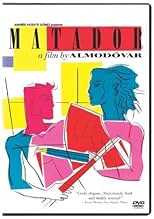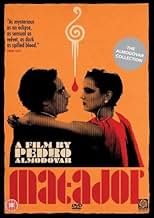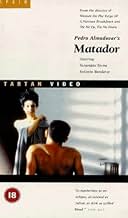A matador is wounded by a bull and can no longer kill in the arena. It is just one of the problems of one of the characters that unexpectedly collide in this film.A matador is wounded by a bull and can no longer kill in the arena. It is just one of the problems of one of the characters that unexpectedly collide in this film.A matador is wounded by a bull and can no longer kill in the arena. It is just one of the problems of one of the characters that unexpectedly collide in this film.
- Awards
- 6 wins & 6 nominations total
Nacho Martínez
- Diego
- (as Nacho Martinez)
Bibiana Fernández
- Vendedora Flores
- (as Bibi Andersen)
Verónica Forqué
- Periodista
- (as Veronica Forque)
Mercedes Jiménez
- Alumna 3ª
- (as Mercedes Jimenez)
Francesca Prandi
- Alumna 4ª
- (as Francesca Romana)
Featured review
Matador is one of the strangest, darkest, (and yet compelling) early films from Spanish master filmmaker Pedro Amoldovar.
It is completely nuts.
Pour in equal measures of sadism, masochism, bullfighting, perverted sexuality, and sexual violence. Add in a splash of comedy and soupcon of star-crossed lovers (if, for a moment, you thought pairing Tybalt and Lady McBeth qualified as star-crossed) and you have what passes as characterisation. Mix dark nights with gaudy flamenco colours and you have some striking cinematography. I'll come to the plot in a minute
Amoldovar was clearly enjoying Spanish cinema's new-found, post-Franco sexual and artistic liberalism. The prudish among his audience might suggest he was positively wallowing in it. Whatever the truth, Matador is a masterpiece of his style, if not, indeed, a whole style in of itself.
The plot or possibly a better description, the tapestry over which the characters move is a murder hunt. Very few prizes will be won, however, for guessing the culprit/s. Two people are quickly in the audience's frame because they are shown er murdering people on camera. A third person (Banderas, in to my mind his best Amoldovar role) confesses to the murders in a fit of insecurity and remorse over an attempted rape ("some girls get all the luck" comments a female duty officer dryly, proving that feminism wasn't that big in Spain back in the 1980s). Nevertheless, the net soon closes on the crushingly obvious culprits (who in the meantime have developed quite a crush on each other). As previously mentioned, completely nuts.
Matador's strengths are in its characterisation and its sheer bare-facedness. Amoldovar has, as usual, assembled a character list of freaks and proceeded to humanise all of them to the point where there is a genuine whiff of tragedy in the final act. To mention the great performances is really to rehearse the cast list. Assumpta Serna, Nacho Martinez, Antonio Banderas and Eva Cobo are all excellent. And it really is worth seeing, just for the young Antonio.
There are some interesting points made in the film about outsiders, liberalism, sexual politics and gender politics (as always with Amoldovar). I'll let you pick through them. It is, though, not so much a film as a giant red rag to the raging bull of conservatism, deftly whisked aside to the ragged applause of an admiring, if somewhat perplexed, audience. A positive Jimi Hendrix of a film, unpolished, with some definite dud notes, but undeniably the work of a genius. 8½/ 10
It is completely nuts.
Pour in equal measures of sadism, masochism, bullfighting, perverted sexuality, and sexual violence. Add in a splash of comedy and soupcon of star-crossed lovers (if, for a moment, you thought pairing Tybalt and Lady McBeth qualified as star-crossed) and you have what passes as characterisation. Mix dark nights with gaudy flamenco colours and you have some striking cinematography. I'll come to the plot in a minute
Amoldovar was clearly enjoying Spanish cinema's new-found, post-Franco sexual and artistic liberalism. The prudish among his audience might suggest he was positively wallowing in it. Whatever the truth, Matador is a masterpiece of his style, if not, indeed, a whole style in of itself.
The plot or possibly a better description, the tapestry over which the characters move is a murder hunt. Very few prizes will be won, however, for guessing the culprit/s. Two people are quickly in the audience's frame because they are shown er murdering people on camera. A third person (Banderas, in to my mind his best Amoldovar role) confesses to the murders in a fit of insecurity and remorse over an attempted rape ("some girls get all the luck" comments a female duty officer dryly, proving that feminism wasn't that big in Spain back in the 1980s). Nevertheless, the net soon closes on the crushingly obvious culprits (who in the meantime have developed quite a crush on each other). As previously mentioned, completely nuts.
Matador's strengths are in its characterisation and its sheer bare-facedness. Amoldovar has, as usual, assembled a character list of freaks and proceeded to humanise all of them to the point where there is a genuine whiff of tragedy in the final act. To mention the great performances is really to rehearse the cast list. Assumpta Serna, Nacho Martinez, Antonio Banderas and Eva Cobo are all excellent. And it really is worth seeing, just for the young Antonio.
There are some interesting points made in the film about outsiders, liberalism, sexual politics and gender politics (as always with Amoldovar). I'll let you pick through them. It is, though, not so much a film as a giant red rag to the raging bull of conservatism, deftly whisked aside to the ragged applause of an admiring, if somewhat perplexed, audience. A positive Jimi Hendrix of a film, unpolished, with some definite dud notes, but undeniably the work of a genius. 8½/ 10
Storyline
Did you know
- TriviaThe film that Maria and Diego stand watching at the cinema is King Vidor's Duel au soleil (1946), an equal lurid tale of wayward passion.
- Quotes
Francisco Montesinos: I've told you not to shoot up in the dressing rooms!
- ConnectionsFeatured in Playboy: The Story of X (1998)
- How long is Matador?Powered by Alexa
Details
- Release date
- Country of origin
- Official sites
- Language
- Also known as
- 鬥牛士
- Filming locations
- Viaducto de Segovia, Madrid, Spain(Bridge where Maria and Diego talk.)
- Production companies
- See more company credits at IMDbPro
Box office
- Gross US & Canada
- $279,394
- Opening weekend US & Canada
- $13,399
- Aug 13, 2006
- Gross worldwide
- $286,126
Contribute to this page
Suggest an edit or add missing content


































